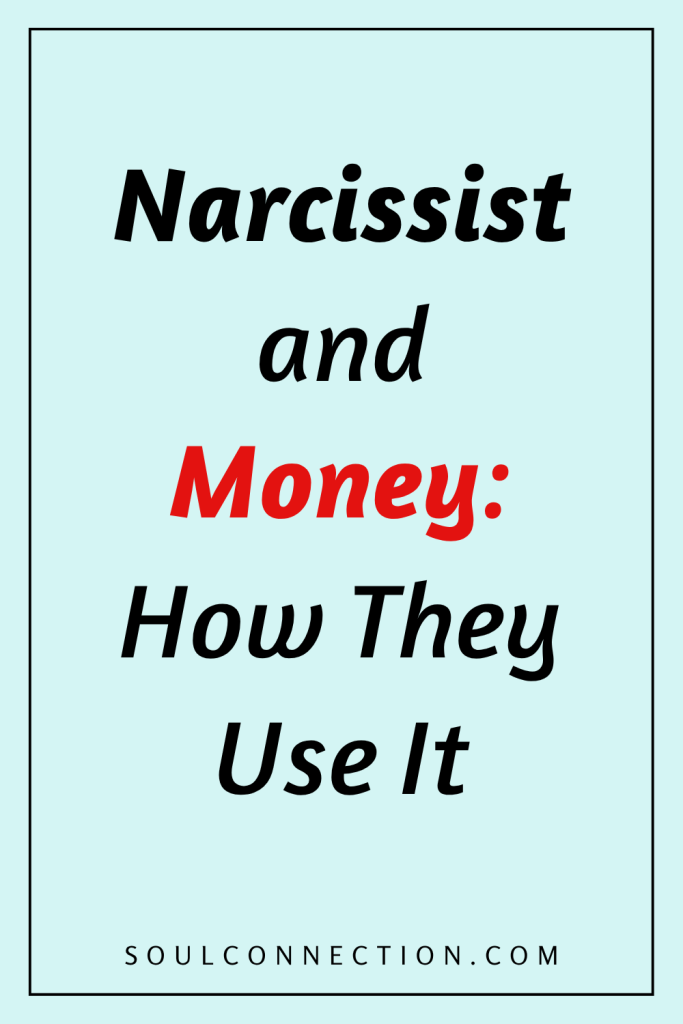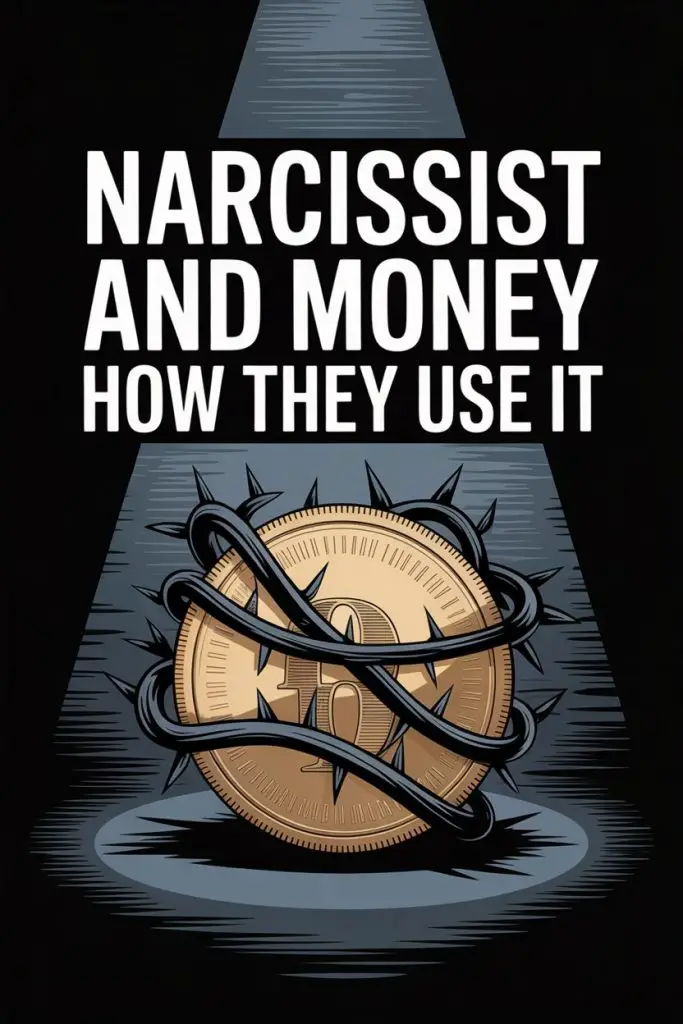Ah, money. The root of all evil, or maybe just the fertilizer for narcissistic garden parties. For most of us, money is a way to pay for groceries, keep the lights on, and occasionally pretend we’re doing better than we really are (hello, fancy latte).
For narcissists? Money is so much more: status symbol, power tool, bargaining chip, and sometimes, a surprisingly effective invisibility cloak for bad behavior.
Let’s get real about how narcissists use money, what it means for anyone tangled up with one, and—most importantly—how to spot the difference between normal financial quirks and straight-up manipulation.
Money as a Mirror: How Narcissists Reflect Their Worth
A narcissist’s self-worth is a fragile thing, requiring constant affirmation—like a smartphone with an always-dying battery. Money becomes a convenient way to charge up that ego.
Flashing a new car, dropping brand names, or insisting on only the “finest” of everything isn’t just about taste. It’s about proving to the world (and themselves) that they’re superior.
If it feels like money flows more freely when there’s an audience, rest assured: it’s not generosity, it’s performance art.
Behind closed doors, though, they might morph into penny-pinchers or financial gatekeepers. If there’s no one to impress, why waste the spotlight?
Control in the Form of a Paycheck
If you’ve ever felt like you’re asking for an advance from the Bank of Narcissus, you’re not alone. One of the most common tools in the narcissist’s arsenal is financial control.
Maybe they insist on managing all the finances, leaving their partners in the dark. Maybe they “forget” to give grocery money or pay half the rent. Or perhaps they buy gifts that look generous on Instagram but leave daily needs unmet.
The message is clear: power lies with whoever holds the purse strings. It’s less about the money and more about keeping the upper hand.
And if you dare to challenge that? Suddenly, you’re “ungrateful” or “bad with money.”
Gifts That Come With Strings (and Sometimes Chains)
Narcissists can be spectacular gift-givers—at least, when there’s applause involved. Grand gestures, expensive surprises, and over-the-top displays are all fair game.
But once the bows come off, beware of the fine print. That fancy weekend getaway might be followed by months of “reminding” you what they’ve done, or worse, used as ammunition in the next argument.
For a narcissist, generosity is a transaction. The gift isn’t given freely; it’s a down payment on your gratitude, loyalty, and compliance.
Nothing says “I love you” quite like a new handbag paired with an emotional receipt.
Playing the Victim, One Expense at a Time
Not every narcissist splashes cash. Sometimes, they’re maestros at working the “poor me” angle. Suddenly, you’re footing every bill, because they’re “struggling” or “just can’t catch a break.”
And if you question it? Cue the Oscar-worthy monologue about how hard life is for them. It’s a neat trick: you shell out, they keep their own funds safe, and you’re left feeling guilty for even asking.
Watch for shifting stories about money, mysterious debts, or a perpetual state of “hard times”—especially when there’s no sign of actual belt-tightening.
Financial Gaslighting and the Magic Disappearing Money
Ever had a conversation about money with a narcissist and walked away doubting your own reality? Welcome to financial gaslighting.
Bills that “never arrived,” shared accounts that mysteriously empty, or purchases you both agreed on that suddenly become “your idea”—it’s all part of the game.
Confusion is a strategy: if you’re too busy doubting yourself, you’re less likely to question their choices.
Financial transparency? That’s for mere mortals. In narcissist-world, only one person needs to know what’s really happening—and spoiler alert, it isn’t you.
Money as a Way to Win (and Never Lose)
Conflict with a narcissist is rarely about resolving the issue. It’s about winning. Money becomes just another arena to prove who’s on top.
Maybe they “accidentally” outbid you on Christmas gifts for the kids. Maybe they drag out divorce settlements, not because they care about the toaster but because letting go would mean losing.
For some, even a shared dinner bill becomes a battleground. They might insist on paying—so they can hold it over you—or refuse, just to prove a point.
Either way, the goal is the same: get the upper hand, keep you off-balance, and remind you who’s boss.
The Charitable Narcissist: Giving for Glory
If you’ve ever watched a narcissist donate to charity, you’ll notice something: the photo op is practically mandatory.
Don’t be fooled by the “generosity.” Large donations, community sponsorships, or picking up the tab at big events are less about helping others and more about burnishing their own reputation.
If their name isn’t on the plaque, what’s the point?
At home, charitable impulses often vanish. The same person who funds a new park bench won’t spot you a tenner for lunch. Public praise? Worth every penny. Private kindness? Not so much.
Money as a Weapon During Breakups
Breaking up with a narcissist can turn money into a minefield. Once you step out of their orbit, expect financial shenanigans: hiding assets, refusing to pay what’s owed, or suddenly “forgetting” shared financial commitments.
Some will drag out legal battles simply to wear you down (or bankrupt you). Others will shower you with cash to lure you back, only to yank it away the moment you hesitate.
The goal is never fairness. It’s punishment, reward, and a desperate attempt to stay in control—even when the relationship is on life support.
How to Spot Financial Red Flags Early
Wish there was a handy checklist for narcissistic money moves? Here’s what to watch for:
- Secrecy around finances (“Don’t worry about it, I’ve got it handled”)
- Big spending in public, stinginess in private
- “Accidentally” forgetting shared expenses—over and over
- Gifting with expectations or reminders of past generosity
- Creating confusion about where money’s going
- Making you feel guilty for asking about money
- Using financial leverage to get their way
If two or more of these already sound familiar…well, you’re not imagining things.
Protecting Yourself Without Losing Your Sanity
Living with or loving a narcissist can make you question everything. But protecting yourself financially doesn’t have to mean living in a bunker.
Keep your own bank account, no matter how much they protest.
Make copies of all financial documents. Insist on transparency—if your partner can’t explain household expenses without huffing and puffing, that’s a sign, not just a bad day.
If things get ugly, don’t hesitate to loop in a neutral third party: a counselor, attorney, or financial advisor. Sometimes, a little professional backup is the best way to cut through the drama.
The Long Game: Healing from Financial Manipulation
Stepping away from a narcissist’s financial games is, frankly, exhausting. It can also be a crash course in rediscovering your own value—beyond your bank balance.
Give yourself time to unlearn the guilt and anxiety that come from years of money mind games. Set small financial boundaries and celebrate every win, even if it just means paying for your own lunch with zero drama.
For some, rebuilding credit or savings becomes a literal act of self-care. For others, simply enjoying a shopping trip without a side of guilt is victory enough.
Healing isn’t linear, but every step away from the narcissist’s playbook is a small rebellion. And let’s face it—some rebellions are worth every cent.
Money Doesn’t Lie (But Narcissists Might)
Anyone can have complicated feelings about money.
But when every dollar becomes a tool for manipulation, it’s not just about dollars and cents—it’s about power, freedom, and, yes, love.
Spotting the signs early can save you a lot more than just cash. It can buy you peace of mind, self-respect, and maybe, just maybe, the freedom to spend your own money however you damn well please.
Now, that’s what I call a smart investment.


